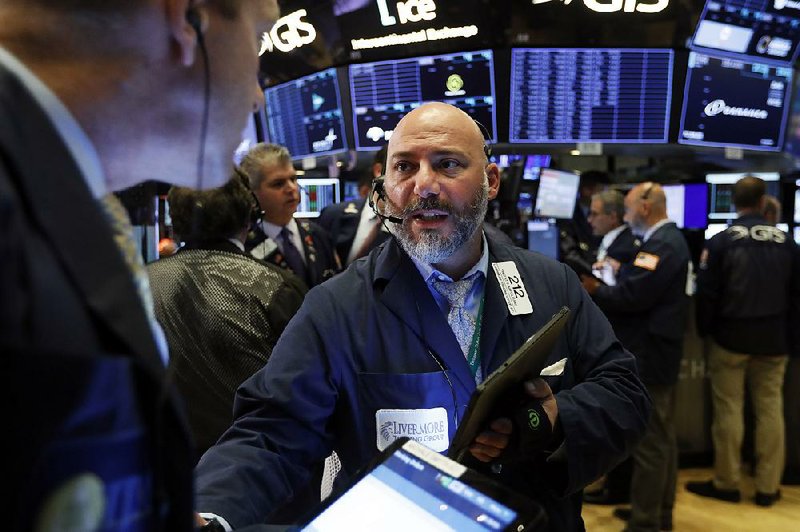Investors flipped back into buying mode Tuesday after the U.S. said it would hold off on tariffs of Chinese imports of mobile phones, toys and several other items typically on holiday shopping lists. China also said the two sides held discussions on trade overnight and would talk again in two weeks.
The latest turn in the U.S.-China trade war helped the market make up much of the losses from the previous two days, snapping a two-day losing streak for the S&P 500.
The benchmark index rose 42.57 points, or 1.5%, to 2,926.32. It had been up as much as 2.1%. The Dow Jones industrial average gained 372.54 points, or 1.4%, to 26,279.91. The index briefly climbed 519 points.
The Nasdaq composite jumped 152.95 points, or 1.9%, to 8,016.36. The Russell 2000 index of smaller-company stocks rose 16.30 points, or 1.1%, to 1,510.58. Oil and copper prices surged.
"Maybe today is a little bit too exaggerated because it was a little glimmer of hope about tariffs," said Karyn Cavanaugh, senior market strategist at Voya Investment Management. "However, the drama with China and trade is not over."
The markets have been in the spin cycle since President Donald Trump announced Aug. 1 that he would impose 10% tariffs on about $300 billion in Chinese imports, which would be on top of 25% tariffs already in place on $250 billion of imports. The threat dashed hopes that a resolution may come soon in the trade war between the world's two largest economies, and investors have grown increasingly concerned that it may drag on through the U.S. elections in 2020.
On Tuesday, The Office of the U.S. Trade Representative said it would delay the tariffs on some products, including popular consumer goods, until Dec. 15. A few other products were removed altogether, including certain types of child seats and fish.
Technology-sector stocks, which have been among the biggest losers during heavy selling days this month, led the broad market rebound Tuesday. Health care companies, retailers and banks also notched solid gains. Real estate and utilities lagged the broader market as investors regained their appetite for riskier assets.
While stocks rallied Tuesday, there are still signs of investor caution. Treasury yields have sunk, and gold prices have jumped as investors search for safety on worries that the trade war could knock the U.S. economy back into recession for the first time in a decade. The yield on the 10-year Treasury rose Tuesday, but it remains below its level when Trump's 2016 election invigorated markets. Gold fell 0.2% but remains near a six-year high.
Retailers were some of Tuesday's best performers because the delay in tariffs means they won't have to raise prices on toys, clothing and other items during the holiday shopping season, the most important months of the year for the industry. Best Buy jumped 6.5%, one of the biggest gains in the S&P 500, and Dollar Tree rose 4% for its best day since March.
"This is a huge relief for retailers for the holiday 2019 season, but the larger issue isn't over," said Ken Perkins, president of Retail Metrics, a retail research firm. "Retailers better be planning to diversify their sourcing even though they're getting some short-term relief."
Other companies that have a lot riding on strong holiday sales, as well as a dependence on China for producing their goods, were also among the market's leaders. Apple climbed 4.2%, Micron Technology added 4.8%, and Hasbro gained 2.7%.
CBS and Viacom rose after the companies announced they have reached a deal to combine into a company named ViacomCBS. CBS gained 1.4%, and Viacom rose 2.4%.
Bonds fell and the yield on the two-year Treasury jumped, partially because of the trade-war developments and partially because inflation was higher than economists expected last month. The inflation report may give the Federal Reserve less leeway to cut interest rates to help the economy.
The 10-year Treasury yield, meanwhile, rose by a smaller margin, to 1.7% from 1.64% late Monday. That leaves the 10-year Treasury yielding just 0.03 percentage points more than a two-year Treasury. When that difference goes negative, investors see it as a warning signal that a recession may be coming. And the gap is now close to its lowest level since the summer of 2007, about six months before the recession.
Information for this article was contributed by Damian J. Troise and Anne D'Innocenzio of The Associated Press.
Business on 08/14/2019
